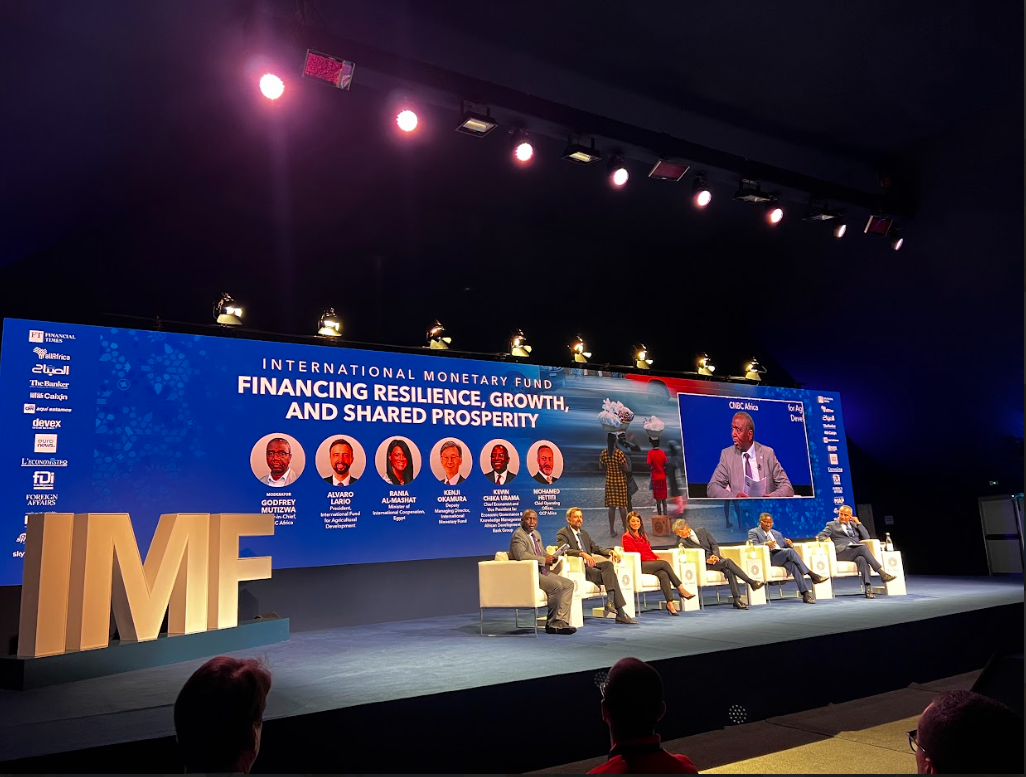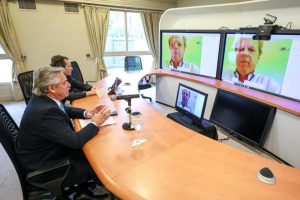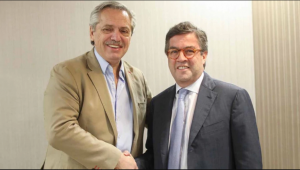Last week, the annual meetings of the International Monetary Fund (IMF) and the World Bank (WB) took place in Morocco. Likewise, a counter-summit was organized that gave space to civil society and social movements to discuss the neoliberal policies promoted by these institutions. Below are some reflections on these events, their limitations and potential, and the particular situation of Argentina.
“Below, we offer a google translate version of the original article in Spanish. This translation may not be accurate but serves as a general presentation of the article. For more accurate information, please switch to the Spanish version of the website. In addition, feel free to directly contact in English the person mentioned at the bottom of this article with regards to this topic”.
The Annual Meetings, which this year took place between October 9 and 13 in the city of Marrakech, are spaces where panels are organized with IMF directors and staff, while civil society has its own forums and exhibition spaces and discussion. At the same time, countless closed meetings occur in parallel to the entire official agenda. All of this aims to be able to discuss how the international financial architecture is organized, which determines under what conditions funds are lent mainly to countries in the global south. The role of civil society in these spaces is to bring their concerns and represent the voices of the people affected by this complex lending infrastructure.
For example, the Coalition for Human Rights in Development presented a report where of 38 projects evaluated, in 36 reprisals were identified against people who defended rights and complained against said loans. This shows that, although the International Financial Institutions (IFIs) make high-level proclamations regarding the importance of human rights, there are no measures or real addressing of the negative consequences on defenders who suffer abuse by security forces. security and the police, judicial persecution, the disproportionate use of force, surveillance, and gender violence and sexual harassment in the particular case of defenders.
Likewise, the Environment and Natural Resources Foundation (FARN) presented in a panel on the IMF’s climate strategy regarding the Argentine case. It was made visible how the need for foreign exchange from exports is pushing the fossil fuel extractivist model and going against the country’s climate change mitigation goals. The emblematic example is Vaca Muerta, which if fully exploited would use the equivalent of 11.4% of the CO2 budget. In this case, we can see how the short-term foreign trade balance needs override any analysis of environmental impacts and put the environmental sustainability of the planet at risk.
Faced with this, in general the authorities and staff of the IFIs present on the panels insist that existing policies are the ones that work, they dismiss the proposals of civil society with their own data and are not very receptive to any criticism. For this reason, spaces like the Counter Summit appear, where the conversation flows in a more critical and sincere way about what is happening with the impacts of loans and projects, allowing a space to unite voices in order to change injustices. that today affect so many countries and communities.
The Counter Summit opened on October 12 with a march, and over the next two days there were both small group and plenary discussion sessions. Finally, on Sunday the 15th, the plenary session closed with a reading of the conclusions, which included the cancellation of illegitimate debts, policies that respect planetary limits, climate and social justice, and promote food sovereignty. Also, let end financial colonialism, that there be financing for projects that allow adaptation to climate change, social security and universal health coverage, and a special proclamation for the rights of women who are those who are most negatively impacted by austerity policies.
Argentina and its link with the IMF
According to Noemí Brenta, Argentina has a very particular relationship with the IMF, since it is the middle-income country that has been under its agreements the longest, directing economic and fiscal policies. Today, not only does it have almost 30% of the IMF’s loan portfolio, but it is a good student: throughout all these years and of 22 agreements, only 5 were suspended by the organization. Therefore, it can be stated that the guidelines recommended by this organization have had great influence on the decisions of the different governments.
However, compliance with the policies has implied a notable deterioration in people’s quality of life. On the one hand, the conditionalities impose that the income that the country has be used to pay creditors (that is, to the IMF and other debtors as well), which in turn implies that social expenses are cut and there is no investment for the country. development. On the other hand, the extractivist model is deepened through the agro-industrial production of commodities, the exploitation of fossil fuels and mining – lithium mining is very popular today due to its potential to contribute to an energy transition towards other renewable sources. This has negative consequences on the environment, does not take into account the impacts on the use of scarce and non-renewable resources such as water, and limits the development of the communities that live in the exploited territories.
Mariano Féliz suggests that the impacts on the paid labor market have clear gender biases, since it is women who have to face intensified unpaid and reproductive tasks, while receiving fewer public services. IMF policies that promote women’s participation in economic activity do so from an instrumental perspective because it improves macroeconomic indicators and provides labor that usually accepts worse working conditions. However, while the employment rate for adult women increased, the employment rate for men, especially young people, decreased. All of this only results in the capitalist tendency to overload women with care tasks for their own homes and communities, for example, through the organization of popular soup kitchens.
For the logic of financing agreements and governments, human rights are an ideal that is difficult to fulfill rather than an obligation. The panorama then in Argentina makes us have to think about how to build a political movement against unsustainable and illegitimate debts, against abusive conditionalities that are detrimental to fundamental rights and people’s lives. It also forces us to reflect on how these Levels of indebtedness and precarious lives are linked to the growth of far-right electoral options, which ultimately also promote anti-democratic discourses and practices.
The challenges are many, they are complex and involve a lot of political articulation. However, the context is urgent, since there is no sustainability of life possible under the policies of austerity, impoverishment and extractivism. We have to continue building collective narratives, mobilizing and supporting communities by defending their territories.
Contact
Carolina Tamagnini, carotamagnini@fundeps.org



